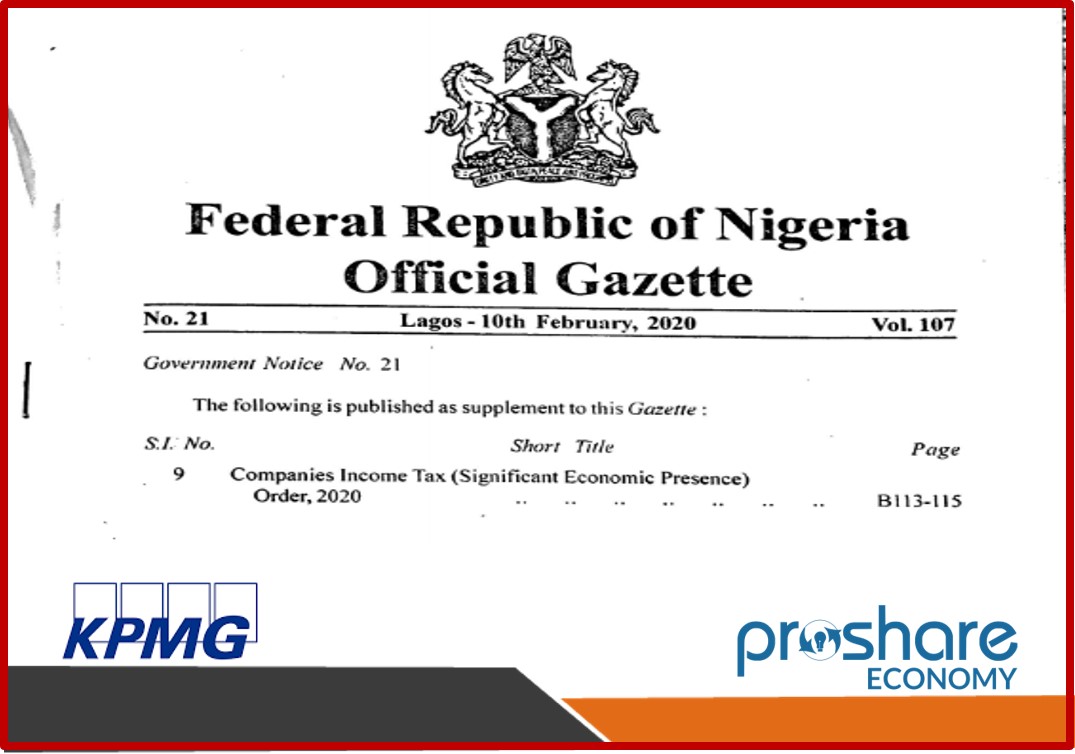Monday, June22 , 2020 / 01:27 PM / by KPMG Nigeria / Header Image Credit: Ministry of Finance, Budget and National Planning
TheFederal Government of Nigeria (FGN) on Friday, 29 May 2020 published theCompanies Income Tax (Significant Economic Presence) Order, 2020 ("the Order")in its Official Gazette No. 21, Vol 107 of 10 February 2020. The Order, whichwas signed by the Honourable Minister of Finance (HMoF), Budget and NationalPlanning, Mrs. Zainab Shamsuna Ahmed, pursuant to her powers under Section13(4) of the Companies Income Tax Act, Cap C21, Laws of the Federation ofNigeria (LFN), 2004 (as amended) [CITA], commenced on 3 February 2020.
TheFinance Act, 2019 ("the Finance Act") introduced the concept of significanteconomic presence (SEP) to expand the scope of Nigerian tax on foreigncompanies deriving income from their activities in the country which werehitherto not captured in the tax net. The Order provides clarification on whatwould constitute a SEP for foreign companies doing business, or providingservices to customers, in Nigeria, in line with Section 13(2)(c) and (e) ofCITA.
Furtherto our Tax Alert Issue No 5.11, we have reviewed the Order and provided ourcommentaries thereon below:
- Determination of SEP for digital activities
TheOrder provides that a foreign company shall have a SEP in Nigeria in anyaccounting year, where it
a.derives N25 million annual gross turnover or its equivalent in other currenciesfrom any or combination of the following digital activities:
- streaming ordownloading services of digital contents, including but not limited to movies,videos, music, applications, games and e-books to any person in Nigeria; or
- transmissionof data collected about Nigerian users which has been generated from such users' activities on a digital interface including website or mobile applications; or
- provision ofgoods or services other than those under sub-paragraph 5 of the Order, directlyor indirectly through a digital platform to Nigeria; or
- provision ofintermediation services through a digital platform, website or other onlineapplications that link suppliers and customers in Nigeria;
b. usesa Nigerian domain name (i.e., .ng) or registers a website address in Nigeria;or
c. hasa purposeful and sustained interaction with persons in Nigeria by customizingits digital page or platform to target persons in Nigeria, including reflectingthe prices of its products or services in Nigerian currency or providingoptions for billing or payment in Nigerian currency.
- SEP and activities carried out by connected persons
TheOrder provides that the activities carried out by connected persons in anyaccounting year shall be aggregated in order to determine whether the N25million annual gross turnover threshold was met. The Order also definesconnected persons as:
a. personsthat are "associates" as defined in the Companies and Allied Matters Act, CapC20, LFN 2004 (as amended) [CAMA]; or
b.persons that are business associates in any form, such that one personparticipates directly or indirectly in the management, control or in thecapital of the other, or the same person or persons participate directly orindirectly in the management, control or in the capital of both enterprises.
- Determination of SEP for technical, professional, management and consultancy services
TheOrder provides that a foreign company providing technical, professional,management or consultancy services shall have a SEP in Nigeria in anyaccounting year where it earns any income, or receives any payment from aperson resident in Nigeria, or a fixed base or agent of a foreign company inNigeria.
- Exemption from SEP
TheOrder exempts the activities of the following foreign companies fromconstituting a SEP in Nigeria:
a. anyforeign company under a multilateral agreement and consensus arrangement toaddress tax challenges arising from the digitalization of the economy who will be treated under such agreementor arrangement.
b. anyforeign company making any payment, where the payment, is made: i. to itsemployee under a contract of employment; or ii. for teaching in an educationalinstitution or for teaching by an educational institution; or iii. by a foreignfixed base of a Nigerian company.
- Definition of terms
TheOrder provided clarifications on the definition of the following termsreferenced in Section 13(2)(c) and (e) of CITA:
a. "anyother electronic or wireless apparatus" is defined to include digital orrelated activities carried on through satellite.
b. "services of a technical nature" means specialised services, such asadvertising, training or provision of personnel other than those involved inthe provision of professional, management and consultancy services.
Commentaries
a.Through Finance Act 2019, Nigeria has joined countries, such as India andIsrael, that have codified the SEP rule into their income tax laws. The SEPconcept was first documented in the Organisation for Economic Co-operation andDevelopment (OECD)'s Base Erosion Profit Shifting (BEPS) Action 1 final reportin October 2015. BEPS Action 1 seeks to address tax challenges of the digitaleconomy. The 2015 report on BEPS Action 1 noted that beyond BEPS,digitalisation raised a series of broader direct tax challenges. These challengesmostly relate to the question of how taxing rights on income generated fromcross-border activities in a digital transaction should be allocated amongcountries in order to secure and sustain the international income tax systemand increase tax equity amongst traditional and digital businesses. However, asthe world economies are at different stages of digitalization and development,there has been no consensus on the acceptable method of taxation of the digitaleconomy. This led to the design of the programme of work to provide aconsensus-based long-term solution that will address the challenges of thedigitalisation of the economy. The BEPS Action 1 work has evolved over the last5 years into what is now known as Pillars 1 and 2. While Pillar 1 focuses onthe allocation of taxing rights, Pillar 2 deals with global anti-base erosionmechanism (global minimum tax). It is expected that BEPS Action 1 will befinalized by the end of this year when a consensus approach will be agreed uponamong the over 130 countries (including Nigeria) involved in the negotiations.
b. Oneof the main challenges discussed under Pillar 1 work programme is theadministration of taxing right. The work programme recommended developing acollection mechanism for withholding tax, new reporting obligations andinformation dissemination to the tax authorities, and modalities for addressingtechnical and practical issues that may arise in determining and reporting thelocation of sales. However, there is no clear provision in the Order thataddresses any of these issues as it affects the implementation of SEP inNigeria. It is unclear how the Order is to be administered particularly asselfassessment may not be the appropriate means of efficient administration forbusinesses not used to or not aware of tax obligations in Nigeria.
c.There are concerns about the interplay between Nigerian Double Tax Treaties(DTTs) and the Order. Based on international norms, the provisions of the DTTsupersede local tax laws. Hence the Order, being an extension of CITA, shouldnot apply to companies based in countries with which Nigeria has a DTT. Hence,the need for revisions to be made to existing treaties to address this newnexus.
d. TheOrder did not give any guidance on whether the CIT returns filed by qualifyingcompanies will be based on actual or deemed income basis. This is veryimportant given the recent disputes between the FIRS and non-resident companies(NRCs) since the FIRS' 2015 directive requiring NRCs to file their CIT on actualincome basis just as Nigerian companies. However, there has been recent caseswhere the FIRS has disregarded the actual income-based CIT returns and assessedthe NRCs to CIT on deemed income basis because it yielded a higher taxcollection.
Further,there is no provision that addresses withholding tax compliance on qualifyingonline transactions with corporate customers. It is, therefore, important thatadequate clarifications are provided on the above issues to minimise disputesby the affected taxpayers with the FIRS.
e. TheOrder limited its definition of "connected persons" to only associates asdefined by the CAMA or business associates, i.e., persons controlled by orunder common control. This appears to be at variance with the definition ofconnected persons in Paragraph 6(a) of the Seventh Schedule of CITA which ismore expansive, and includes any person under common control, ownership ormanagement, any person not connected but receives implicit or explicitguarantee or deposit for a debt and any related party as described in theIncome Tax (Transfer Pricing) Regulations, 2018. Therefore, there is a riskthat the above varying definitions could result in potential disputes betweenthe taxpayers and the FIRS. In the final analysis, if the definition of theterm in the Order is not revised, the definition in Paragraph 6(a) of theSeventh Schedule to CITA would prevail to resolve the conflict.
f. TheOrder was silent on the ownership or control of the electronic or wirelessapparatus such as satellite or other connected servers, receivers ortransponders used in the provision of digital services. This is a significantomission given the complexity of the value chain of digital services involvingthe use of satellites and associated equipment.
g.Unlike India that deferred the implementation of its SEP rule until 2021(pending the outcome of the current round of negotiations at the OECD), theissuance of the Order signals the operationalisation of the SEP rule inNigeria. Interestingly, Paragraph 3 of the Order appears anticipatory of thefuture consensus approach on BEPS Action 1 to be adopted by the OECD. This hasnot only provided for a seamless transition but potentially eliminates theadministrative process of issuing another Order to implement the consensus inNigeria when it is finally announced by OECD. However, until such a time whenthe consensus is reached, the SEP rule will hold sway.
h. TheOrder has a commencement date of 3 February 2020 whereas it was published on 29May 2020. Thus, it would be impossible to expect Nigerian companies toretrospectively account for WHT on payments already made to foreign vendorssubject to the SEP rule. We, therefore, expect that an operational date wouldbe communicated for effective transition and compliance with the provisions ofthe Order. Nonetheless, it is advisable that companies begin to plan and complywith the provisions of the Order immediately to avoid any potential exposure topenalty for default.
Conclusion
It isremarkable that the Federal Government has taken unilateral action to addressthe taxation of the digital economy in its quest for widening its tax net.Paragraph 3 of the Order has also evinced the intention of the Government thatthis is an interim measure which will be overridden by a consensus approach totaxation of the digital economy at the end of the current round of OECDnegotiations. Before then, it is hoped that the FIRS will issue an informationcircular that will clarify some of the issues highlighted above. Meanwhile,taxpayers would need to review their transactions in line with the provisionsof the CITA and the Order and ensure that they discharge their responsibilitiesaccordingly to avoid unnecessary exposures.
Download Here - Companies IncomeTax (Significant Economic Presence) Order 2020
Related News
- Minister of Finance Issues Order on Significant Economic Presence by Non-Nigerian Companies
- Matters Arising from Implementation of Finance Act 2019
- COVID-19 Impact: Taxpayers' Responsibility and Expectations
- Tax Administration in Challenging Times and Future Outlook
- Taxing Nigeria's Digital Economy, The Issues
- NCC and FIRS Sign MOU to Ascertain VAT Elements of Telcos' Transactions
- FIRS and New TCC Portal: Understanding the Inconvenient Truth of a Missing Portal
- FIRS Launches New TCC Application Portal
- FIRS' Public Notice on Regularisation of Tax Status of Dormant Companies
- FIRS Extends Deadline for Waiver of Interest and Penalty on Outstanding Tax Liabilities
 Lagos, NG • GMT +1
Lagos, NG • GMT +1











 1550 views
1550 views











 Sponsored Ad
Sponsored Ad
 Advertise with Us
Advertise with Us









